The French Revolution
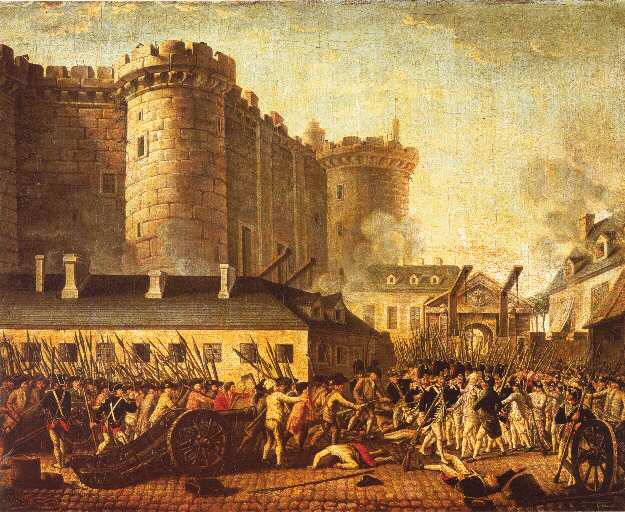
“The relation between art, literature and history is a complex one. The way in which broad historical processes affect art and literature is not a direct one. The poets and writers of England and other lands did not necessarily set out to express political ideas in a conscious way, though some did. The processes we are dealing with here are far more subtle and indirect. They do not express themselves as a conscious decision or trend, but rather a certain mood. However, unconsciously, or at best semi-consciously, poets and writers can and do reflect the general trends in society.” – Alan Woods
Causes of the French Revolution
- Reached its peak in 1793 with the plebeian dictatorship of Robespierre and the Jacobins who were the most revolutionary section of the middle class.
- Monarchy – The rise of commoners and middle class was fostered by a rising economy. People saw the monarchy pilfer the public coffers, build monuments to themselves and their lifestyles, and become detached from reality.
- Transparency – Government and monarchy were acting in secrecy and privacy without regard to the concerns of the public. Taxes were increasing, less representation, and less public works and aid.
- Enlightenment Thought – New thoughts expanded the personal existence and elevated oneself to a higher state. No longer did people feel downtrodden, but rather inspired to challenge the world and make a better life for themselves and their posterity
- Economics and Finances
- Debt – France was near bankruptcy due to grand buildings and the lavish lifestyle of the monarchy and court. They were also in debt from wars and failed international agreements. The government could not aid the taxpaying and law abiding citizens, therefore they began to rebel.
- Taxation – People were becoming over burdened with excessive taxes and they had enough and it eventually led to a cause of the revolution.
- Reforms – Reforms to stabilize the government and give more power to the monarchy failed and left the country far worse than it was previously and it adversely affected the citizenry.
- Society
- Famine – Widespread famine swept across the country and many people starved to death. Even though this was not caused directly by the government, it was another problem that fueled the fire enraging around the populous.
- Religious – People were questioning the church and with questioning the church came questioning the government.
- Scientific – As science began to grow and the scientific thought process creeping into the minds of the citizenry, it added to the cause-and-effect thinking about one’s life. When carefully and factually evaluating a situation one can better put forward an argument and more clearly define ones principle complaint. This thought process fueled the hatred of the government.
- Class – Unlike England who was modernizing and industrializing, France was in the middle of a bitter class struggle. It defined the society and the thinking of the day. This caused bitter rage and ire against the powers that be and translated into the revolution.
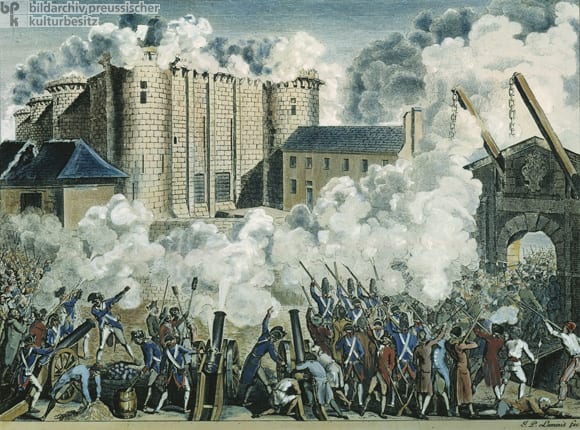 |
| The Storming of the Bastille |
“The Revolution of 1789 hit England like a thunderbolt. It shook up the whole social and political edifice of Britain.”
– Alan Woods
- The revolutionary poets of the 1790s did not confine themselves to the written word but attempted to establish links with the people, identifying themselves with the poor, the oppressed, the insulted and humiliated.
- William Hazlitt wrote: [they] scorned “degrees, priority, place, and the distinctions of birth,” and “were surrounded by a rabble of idle apprentices and Botany Bay convicts, female vagrants, gypsies, meek daughters in the family of Christ, of idiot boys and mad mothers, and after them ‘owls and night-ravens flew’.”
- The British Poets identified with the struggles of the common French person and they wrote to express the attitude and anger they held.
Writers of the French Revolution
William Blake (1757-1827)
- Wrote The French Revolution in 1791,
-
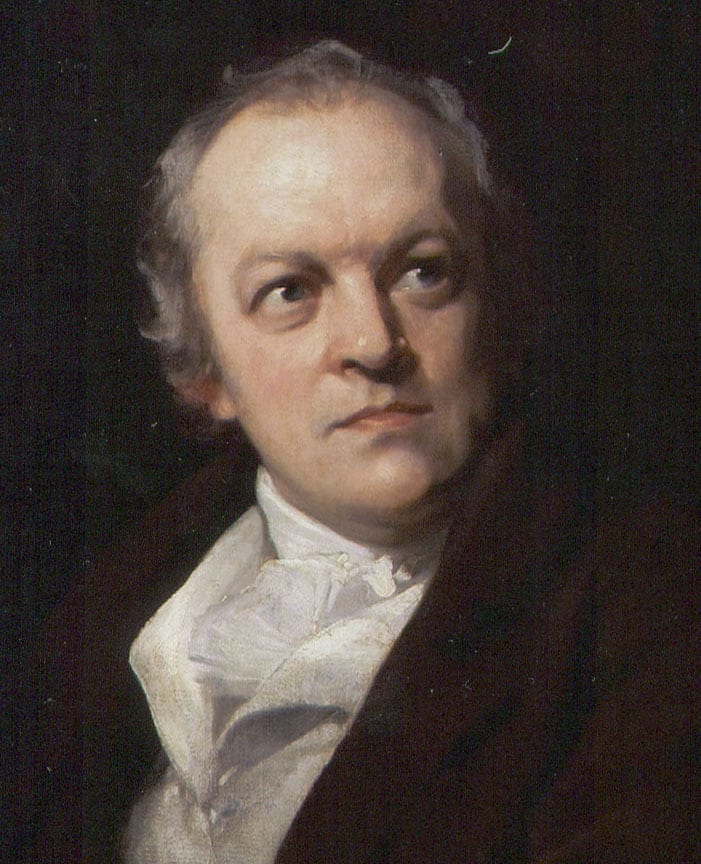
William Blake Had it printed anonymously, only distributed to political sympathizers so he could avoid public outcry.
- He developed his attitude of revolt against authority, combining political beliefs and visionary ecstasy.
- First book of a projected seven books Blake wanted to write, no one is even sure if he ever wrote them because they were never found
- Radical Bookseller Joseph Johnson was responsible for the printing in 1791 because he was the only one that would do it for fear of retribution, it was only given to political sympathizers because he feared what would happen if anyone else found out.
-
- The Marriage of Heaven and Hell in 1790
- Emphasis was placed upon on “Liberty, Equality, and Fraternity.”
- Attitude towards The Revolution: he was against authority and feared government persecution for his beliefs
- He sympathized with English radicals like Thomas Pain and William Goodwin.
- He originally sympathized with the French revolutionaries, but the Reign of Terror made him despise the Revolution.
- http://www.wwnorton.com/college/english/nael/romantic/topic_3/blpoem.htm
- Some of Blake’s contemporaries called him a harmless lunatic.
- Blake was also an artist, and his paintings express the chaotic and tumultuous nature of the revolution.
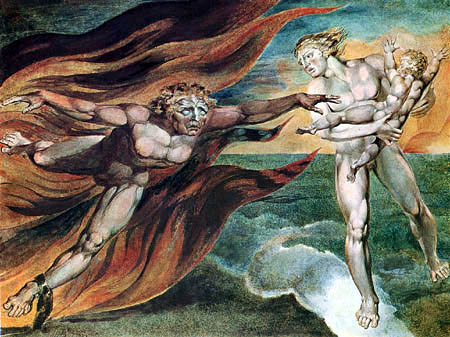
“Angels of Good and Bad”, Blake
William Wordsworth (1770-1850):
“Bl

William Wordsworth
iss was it in that dawn to be alive, but to be young was very heaven!” – Famous quote at the beginning of the revolution expressed his enthusiasm which did not last long.

- Letter to the Bishop of Llandaff 1793, pamphlet that gave support to the French Revolution to reflect his initial feelings
- After the Reign of Terror from September 1793 to July 1794, he became a radical, publishing The Borderers in 1796 to reflect his new views.
- The French Captain Michel Beaupuy strongly influenced Wordsworth in forming political ideals, and his presence was so important to the young poet that Wordsworth mentions the captain in Book Nine of The Prelude.
- Wordsworth hoped that France would be a “work of honour” and a democratic government could not work unless there were men like Beaupuy to ensure there were radicals to stand for this honor and freedom.
- The young Wordsworth had great hopes for the Revolution, and he believed that once a republic was firmly in power in France, he and his contemporaries “should see the people having a strong hand/ In framing their own laws; whence betters day; To all mankind” (Wordsworth, Book IX, lines 517-18).
- As a Romantic, Wordsworth believed in the equality of all men and saw the monarchy as an institution that sought to take away this equality.
- Wordsworth believed in the equality of all men like most Romantics of the time, and he viewed the monarchy as a means of taking away equality.
- Wordsworth had great hopes for the Revolution, and he believed that once a republic was firmly in power in France, he and his contemporaries “should see the people having a strong hand/ In framing their own laws; whence betters day; To all mankind” (Wordsworth, Book IX, lines 517-18).
- Once the Reign of Terror and England’s declaration of war against France, he became torn between his ideals of freedom and equality and all the bloodshed he saw going on around him.
- He went from being a Republican with dreams of equality for all men, to a conservative who wished to preserve the stability and resume order in England.
Jane Austen (1775-1817):
 |
| Austen As a Young Girl |
- Born in Stevenson, England, in 1775
- Lived through the American Revolution, French Revolution, Napoleonic Wars, and Industrial Revolution.
- Began publishing anonymously to prevent her from becoming known as an author and hide from the shameful opinion of women in the public sphere.
- Due to the French Revolution, England was poorly affected politically which made Austen’s entire life a struggle for survival.
- Although Austen did not directly refer to the French Revolution in any of her literary works, the French Revolution did disrupt her world.
- Austen was connected to many of these great events through members of her own family who were involved in the political aspects of the war.
- According to the novel, Jane Austen and the French Revolution by Warren Roberts, Robert’s is shocked at the fact that with all of these hardships in Austen’s life, she did not directly write about them in any of her works but did incorporate them indirectly.
- Through Austen’s work, you cannot see the direct impact on her from the Revolution but you can see her responses to the world around her.
- In a majority of her novels, social reality and class structure were common themes.
- Pride and Prejudice:
- Published in January 1813
- Written at the time of the revolution
- Story indirectly depicts the Austen’s view of the French revolution in England.
- English society rapidly began to grow and social transformation became a part of the lives of the people living in England during this time.
John Keats (1795-1821):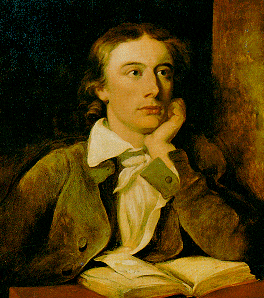
- Keat’s was one of the later poets during the romantic era.
- During his life Keats faced many hardships including being part of the lower class, having poor health, and limited education.
- “Hyperion” and “The Fall of Hyperion” are about Titans’ fall to Olympians, many critics have thought these works were based off of the French Revolution.
- These show limited evidence that Keat’s was effected by the Revolution.
- Unlike, Coleridge and Wodsworth, the influence of the French Revolution are not as pronounced in Keat’s literary work.
- The ideas and changes of the Revolution were directly seen in major poets of this time, but these themes were not present in Keat’s writings.
- In “Ode to a Nightingale,” and “Ode on a Grecian Urn,” Keat’s emphasizes the beauty of the world, which was a common theme in many of his works.
- “Beauty is truth, truth beauty, – that is all ye know on earth, and all ye need to know” – From Keat’s “Ode on a Grecian Urn.
- This theme of beauty was an unusual theme due to all of the hardships of this time period.
- Keat’s focused on the beauty he sees in nature, art, and humans.
- Although, the French Revolution affected most of the poets during the time period, it did not severely affect Keats as much as it did others.
Samuel Taylor Coleridge (1772-1834):
 |
| Young Samuel Coleridge |
- He is quoted as saying his early zeal for revolution was a “sqeaking baby trumpet of sedition”
- He joined the reformist movement stimulated by the revolution and abandoned his studies in 1793 for the cause
- He studied politics in college where he became a big supporter of the French Revolution
- “Like fiends embattled by a wizard’s wand, The Monarchs marched in evil day, And Britain joined the dire array; […] For ne’er, O Liberty! with partial aim I dimmed thy light or damped the holy flame; But blessed the paeans of delivered France, And hung my head and wept at Britain’s name.”
- Shared similar ideals to Wordsworth, started off enthusiastic but lost his zeal at the end of the Revolution
- “You cannot conceive the tumult, calumnies and apparatus of threatened prosecutions which this event [the presence of Wordsworth] has occasioned round about us. If you too should come, I am afraid that even riots and dangerous riots might be the consequence.” (Quoted in E.P. Thompson, The Romantics, 49).
Lord Byron (1788-1824):
- Seen as a complete rebel
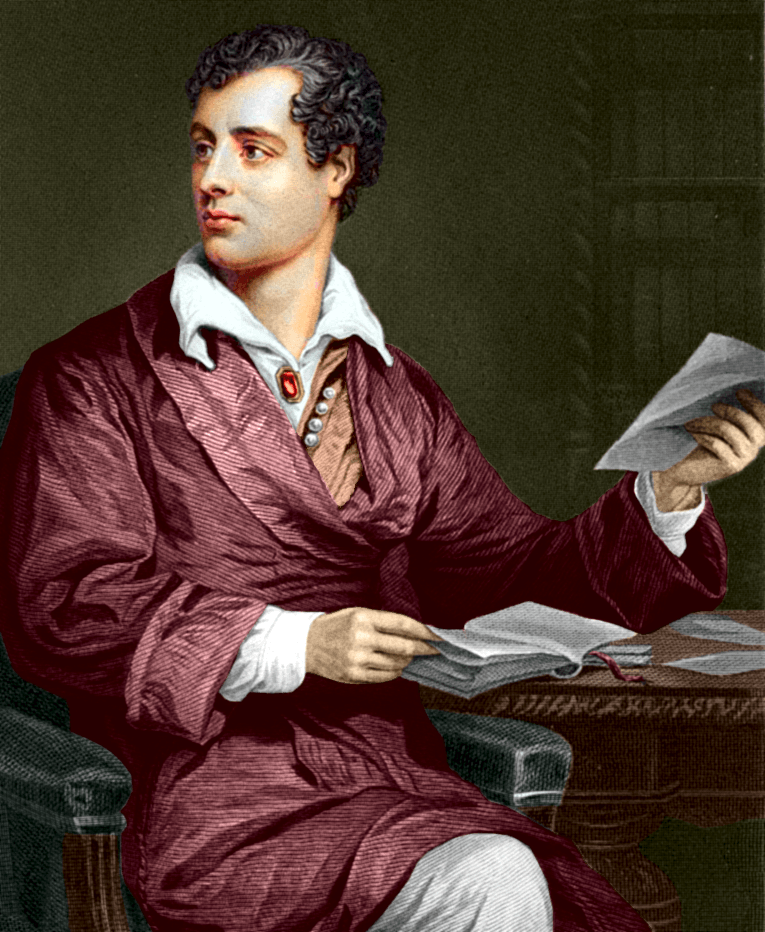
George Byron Admiration for Napoleon
- “Proletariat”- new revolutionary force took shape after Wordsworth & Coleridge
- In the poem, “King Ludd” supported the textile workers when conditions got bad after Napoleon’s defeat and the outbreak of violence and poverty
- spoke of the evils of capitalism and supported the working class
- “These men merely destroyed their looms…, which had become impediments to earning their bread”
- An Englishmen and strong Napoleon supporter, he often felt alienated from his native land. Showed both support for the revolutionary cause and a defiance against England.
- Childe Harold’s Pilgrimage
- Don Juan
- “Romanticism in general, and the poetry of Byron in particular, corresponds to the period in the early 19th century when the storm and stress of the French Revolution had calmed down, when the bourgeoisie had set its fat rump firmly in the saddle, and was getting down to the serious business of making money.”
“The true difference between Byron and Shelley consists in this, that those who understand and love them consider it fortunate that Byron died in his thirty-sixth year, for he would have become a reactionary bourgeois had he lived longer; conversely, they regret Shelley’s death at the age of twenty-nine, because he was a revolutionary through and through and would consistently have stood along with the vanguard of socialism.” (Marx and Engels, On Literature and Art, pp. 320-1.)
Percy Bysshe Shelley (1792-1822)
 |
| P. B. Shelley |
- Percy Bysshe Shelley was born in 1792, the year of the deposition of Louis XVI and the September massacres in Paris. Like those of the first generation of Romantic poets, Shelley’s views were shaped by the French Revolution and its aftermath, but he came to maturity in a very different political climate. (http://www.wwnorton.com/college/english/nael/romantic/topic_3/explorations.htm)
- He wrote a political pamphlet A Declaration of Rights, on the subject of the French Revolution, but it was considered to be too radical for distribution in Britain
- In 1822 Shelley, moved to Italy with Leigh Hunt and Lord Byron where they published the journal The Liberal. By publishing it in Italy the three men remained free from prosecution by the British authorities. The first edition of The Liberal sold 4,000 copies.
 |
| The French Revolution |
References:
Faria, Miguel (14 July 2004). “Bastille Day and the French Revolution, Part II: Maximilien Robespierre — The Incorruptible”. La Nueva Cuba. http://www.haciendapub.com/lnc7.html
” French Revolution and William Blake.” William Blake. 4 May 2007. Web. <http://www.wwnorton.com/college/english/nael/romantic/topic_3/blpoem.htm>.
German History in Documents and Images. The German Historical Society. <http://germanhistorydocs.ghi-dc.org/index.cfm>. Accessed on May 13, 2010
Kreis, Steven. The History Guide: The Origins of the French Revolution. October 30, 2006. Accessed May, 2010. http://www.historyguide.org/intellect/lecture11a.html
Punter, David. “The French Revolution”. The Literary Encyclopedia. 17 July 2001
Thomas, E. P. The Romantics. New York: New Press, 1997.
Ward & Trent, et al. The Cambridge History of English and American Literature: The Period of the French Revolution. New York: G.P. Putnam’s Sons, 1907–21; New York: Bartleby.com, 2000. www.Bartleby.com/cambridge
Woods, Alan. British Poets and the French Revolution. London. 2003. Accessed May, 2010. http://www.marxist.com/ArtAndLiterature-old/british_poets1.html
“Jane Austen and the French Revolution.” Warren Roberts. London: Macmillan, 1979. Print.
Bhattacharya, Lopa “The Poetry of John Keats – A Celebration of Beauty, Classicism and Romantic Richness.” The Poetry of John Keats – A Celebration of Beauty, Classicism and Romantic Richness. 20 Nov. 2007 EzineArticles.com. 24 May. 2010 <http://ezinearticles.com/?The- Poetry- of- John- Keats- – -A- Celebration- of- Beauty,- Classicism- and- Romantic- Richness&id=843042>.
Images (Order of Appearance)**
Storming of the Bastille: https://sites.udel.edu/britlitwiki/files//2018/06/87770.jpg
Robespierre: https://sites.udel.edu/britlitwiki/files//2018/06/robespierre1.gif
Storming of Bastille: https://sites.udel.edu/britlitwiki/files//2018/06/0000608120copy.jpg
Blake: https://sites.udel.edu/britlitwiki/files//2018/06/william-blake-portrait1.jpg
Angels of Good and Bad: http://www.reproarte.com/files/images/B/blake_william/0338-0007_die_engel_des_guten_und_des_boesen.jpg
Wordsworth: http://www.jamessmithnoelcollection.org/images/william%20wordsworth.jpg
Austen: https://sites.udel.edu/britlitwiki/files//2018/06/jane-austen-as-a-young-girl.jpg
Keats: https://sites.udel.edu/britlitwiki/files//2018/06/KeatsColor.gif
Coleridge: http://englishteacherman.files.wordpress.com/2010/03/young-coleridge.jpg
Lord Byron:
http://phoggydaysphoggynights.files.wordpress.com/2009/10/john-keats2.jpg?w=233&h=299
https://sites.udel.edu/britlitwiki/files//2018/06/Lord_Byron_coloured_drawing.png
Percy Shelley: https://sites.udel.edu/britlitwiki/files//2018/06/percy_bysshe_shelley.jpg
French Revolution: https://sites.udel.edu/britlitwiki/files//2018/06/frenchrevolution.jpg
